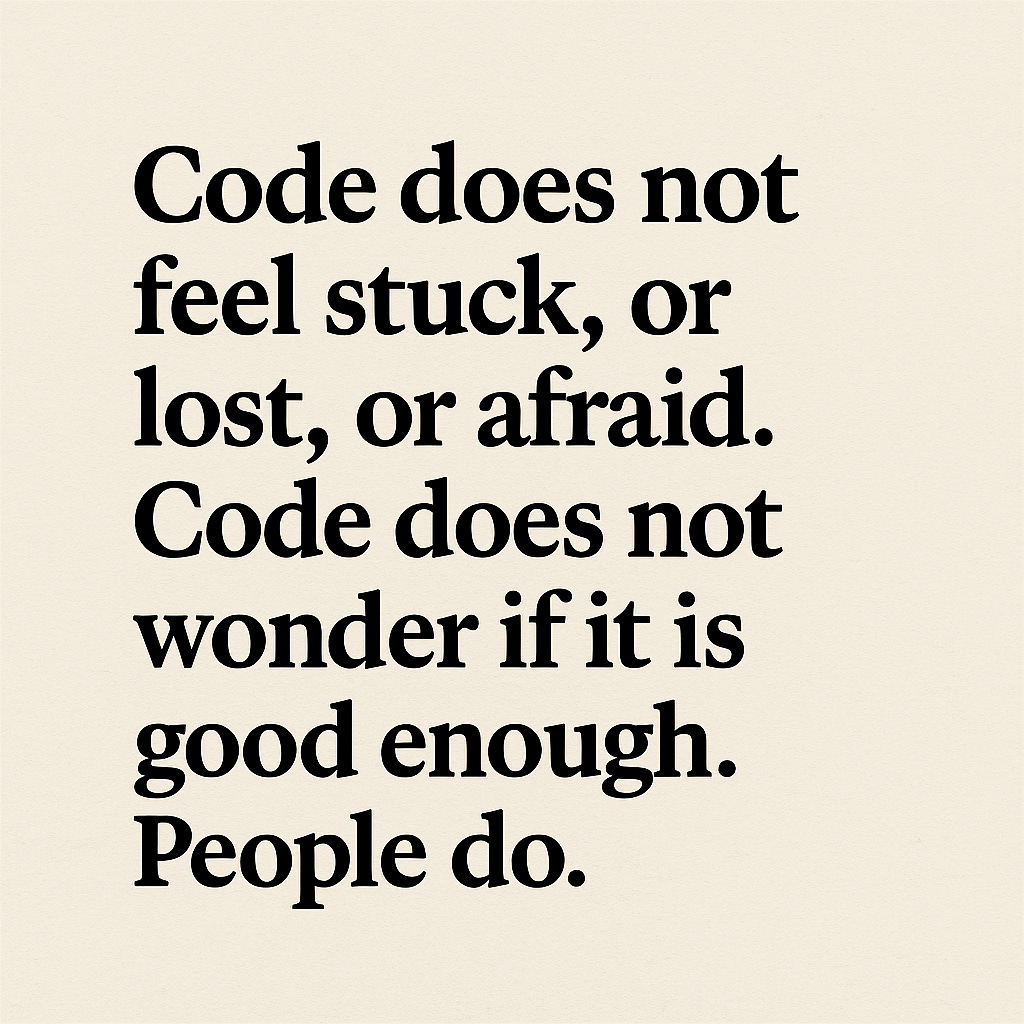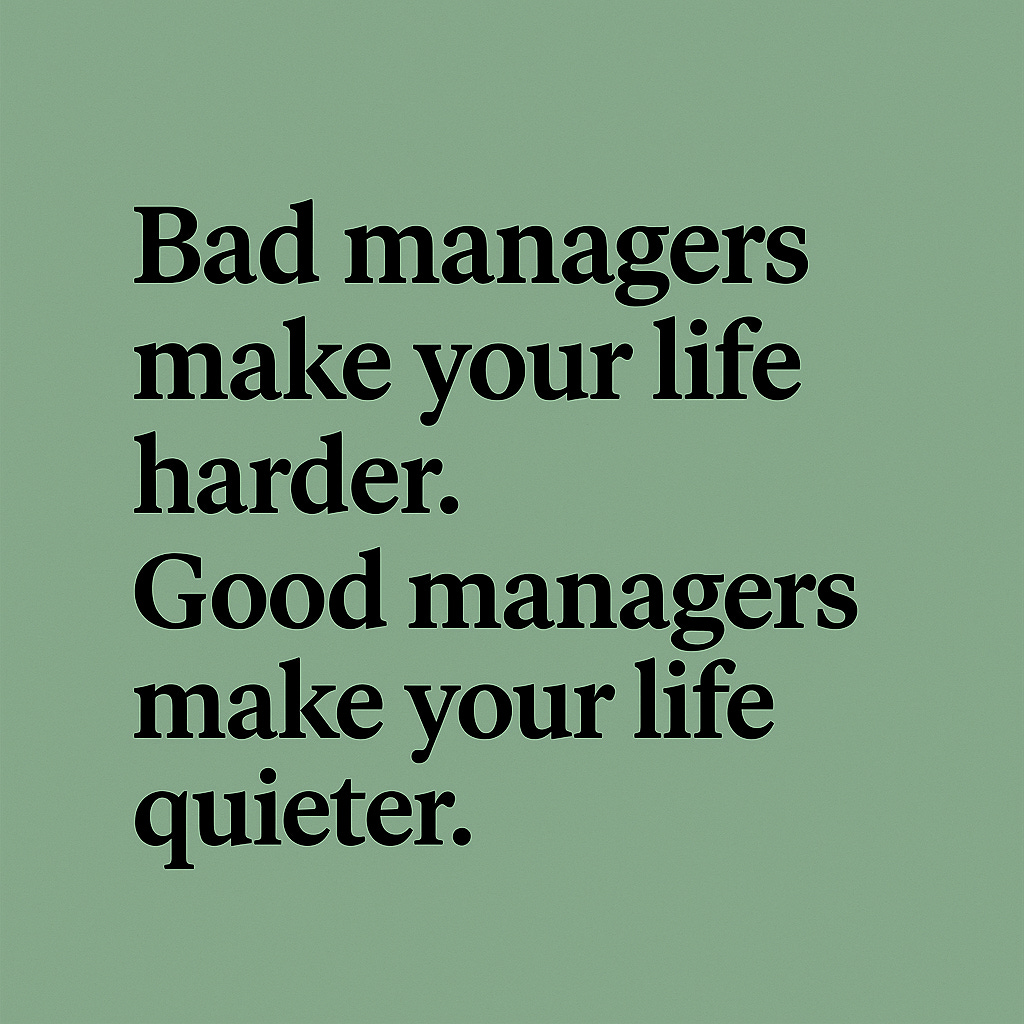So You Think Your Manager Sucks
What engineers get wrong about management, and what good managers actually do all day
There is one universal truth in tech: engineers love to roast their managers.
Everywhere I have worked, the jokes are the same.
"Must be nice, just sitting in meetings all day."
"What do managers even do?"
"My manager just forwards emails and books meetings."
Honestly, I get it.
Early in my career, I thought the same. Management looked like a weird career graveyard for people who could not or would not code anymore.
Then I became a manager.
And I realized two things.
First, yes, there are absolutely terrible managers out there. Lazy ones. Political ones. Clueless ones. Managers who are exactly the stereotype.
Second, and way more important, good management is some of the hardest, messiest, most emotionally draining work I have ever done.
Not because it is complicated like writing code.
Because it is complicated like dealing with humans.
Especially when you are managing an international, fully remote team, spread across cultures, languages, and timezones, where communication is hard, trust takes forever, and context disappears in an instant.
So this is not a defense of managers.
This is a field report.
Here is what the job actually looks like when you care. Here is what keeps us up at night. Here is why good management is invisible, and why invisible work is still work.
And maybe, just maybe, next time you think your manager does nothing, you will pause.
Not for long.
Just long enough to wonder what they are doing behind the scenes so that you do not have to.
1. The Invisible Work of Engineering Management
One of the biggest misconceptions about engineering managers is that we do nothing. Or worse, that we only do meetings and status updates and then go around taking credit for other people’s work.
The reality is that the job is absolutely packed with work, but most of it is invisible if you are not the one doing it. It is invisible because it happens in conversations, in Slack DMs, in documents nobody reads, in fights you prevent before they happen. It is invisible because it looks like "talking" but it is actually "thinking through problems together." It is invisible because good management removes friction before you even notice it was there.
But the real killer is context switching.
As an IC, you usually have 1 or 2 big problems in your head. As a manager, you juggle 15 at any given time. Someone’s unhappy with their project. Someone else is underperforming. You need to review next quarter’s hiring plan. There is an exec review coming up. Oh and your team just accidentally shipped a bug to production. Meanwhile, you are also supposed to write a performance review for someone while another person needs coaching on stakeholder communication.
Your brain never stays in one place long enough to feel productive. Instead, you hop between topics like a browser with 75 tabs open, all auto-refreshing and screaming for attention.
Your calendar? Forget it. Meetings show up like pop-up ads. One-on-ones, team syncs, skip-levels, leadership calls, hiring interviews, stakeholder updates, ad-hoc "quick chats" that are never actually quick.
Add to this the fact that decisions never stop coming. You are constantly making choices, about people, projects, priorities, words. And while many engineers love the clarity of solving a technical problem, management is the opposite. There is rarely a clean, right answer. There is only tradeoff after tradeoff after tradeoff.
By the end of the day, you are exhausted not because you "worked hard" in the traditional sense, but because your brain has been running an emotional operating system at 100 percent CPU for hours. And most of that work is completely invisible.
2. Managing People is Hard, Managing Humans is Harder
Managing people sounds simple on paper. Set expectations, give feedback, check progress, unblock them, repeat.
Managing humans is an entirely different sport.
Every person comes with their own story, their own fears, their own triggers. What motivates one person drains another. What sounds like helpful feedback to you might sound like an attack to them. What sounds like silence to you might sound like disappointment to them.
You cannot treat everyone the same. That is not fairness, that is laziness.
The job is part coach, part therapist, part translator, part bad news delivery service. Some days people want advice. Some days they just want to vent. Some days they want you to shut up and listen. Knowing which day is today is an underrated skill.
Feedback is a minefield. Say it too softly and it gets ignored. Say it too directly and it crushes someone’s confidence. Say it at the wrong time and it ruins trust. Get it wrong enough times and people stop telling you the truth.
And when someone is struggling, it does not feel like a work problem, it feels like a human one. You stay up at night replaying the conversation. Did I say it wrong? Did I support them enough? Are they scared of me now? Are they scared for their job? Are they okay?
People issues are heavier than technical ones because code does not cry in one-on-ones.
Code does not feel stuck, or lost, or afraid. Code does not wonder if it is good enough. People do.
That is why managing humans is the hardest part of this job.
3. Remote, Async, Global: the Hard Mode
Managing a team is already difficult. Managing a remote, international, async team is playing the game on hard mode with friendly fire always on.
Forget all the management advice that starts with "just grab coffee together" or "swing by their desk." There is no desk. There is no coffee. There is only Slack, Zoom, Google Docs, and the eternal hope that your words land the way you meant them.
Trust, which is the foundation of any good team, takes forever to build remotely. In an office, you build trust almost accidentally. In little moments. Jokes by the coffee machine. Sighing about the same bad meeting. Seeing someone’s body language when they are struggling.
Remote strips all of that away. Now you have to manufacture trust on purpose. Write more. Talk more. Check in more. And still, sometimes it feels like yelling into the void.
And then there is culture. Not company culture, but actual culture. People from different countries carry different habits, different assumptions, different social rules.
Silence can mean respect in one culture, disapproval in another. Saying "no" directly is polite in some places, rude in others. Sarcasm is hilarious in one country, offensive in another. Feedback can feel clear to you and aggressive to them. Or too soft. Or just confusing.
Add to this the timezone problem. Async work sounds beautiful in theory. In practice, it means someone is always asleep when a decision needs to be made. Someone always waits longer. Someone always feels left out.
So you start overcompensating. Writing longer Slack messages. Recording Looms. Leaving detailed context in Jira tickets. And still someone will say "Sorry, I missed this" because of course they did, they are human, not a notification-processing machine.
Even video calls, which are supposed to bring people closer, drain your energy faster than real life. Staring at a grid of faces, trying to read micro-expressions through bad internet connections, wondering if that long pause means confusion or someone is just lagging.
Remote management is not just logistics. It is emotional labor at scale. Every message, every call, every decision needs extra care, extra clarity, extra patience.
Because when you cannot read the room, you have to build the room.
4. The Weight of Caring
This is the part nobody tells you about management.
The hardest part is not strategy. It is not performance reviews. It is not planning or process or communication.
The hardest part is caring.
Caring deeply, genuinely, fully about a group of humans who do not belong to you but who trust you, at least a little, with their time, their growth, and their well-being.
When you care, the job follows you home. It stays in your head when you are cooking dinner. It shows up in your dreams. It sits with you on weekends.
You worry constantly.
You worry that people are burning out but not telling you.
You worry that someone feels isolated and disconnected.
You worry that someone is unhappy but too polite to say it.
You worry that someone is about to quit and you did not see it coming.
You worry that someone is quietly disengaging because they feel stuck or underpaid or undervalued.
And you worry even more when it is your job to do something about it, but you are not sure what.
Sometimes you have to tell someone they are not performing. And you know that conversation will probably ruin their week. Maybe their month. Maybe their confidence. Maybe their relationship with you forever. But you have to say it because it is the job.
Sometimes you have to tell someone they are doing great, but the company cannot give them a raise right now. And it feels like lying, even if you are being honest.
Sometimes you have to protect your team from leadership chaos, layoffs, budget cuts, bad decisions. Not by hiding the truth, but by holding the weight of it until it is the right moment to share.
Sometimes you have to tell a team of smart, talented, committed people that their project is getting killed anyway.
And sometimes you just sit there, staring at Slack, wondering how to phrase one sentence that will carry the right amount of empathy, clarity, and honesty, without breaking the person on the other side.
It is invisible work.
It is emotional work.
And it is the part of management that nobody really prepares you for.
5. No Playbook, No Safe Answers
One of the most frustrating parts of being a manager is realizing just how little of the job comes with a clear answer.
Engineers love clear answers. This code works, that code does not. This query runs fast, that query times out. There is a bug, you fix the bug.
Management is not like that.
Management lives in the world of tradeoffs. Everything you do is a choice between imperfect options. Everything is situational. Context is everything, and context changes all the time.
You want to give people freedom but you also want consistency. You want transparency but you cannot always share everything. You want velocity but you cannot burn people out. You want psychological safety but you also have deadlines and performance expectations.
Every decision has second-order effects you cannot fully predict.
Make a decision too fast, people feel left out. Make it too slow, people feel blocked. Be too soft, people get complacent. Be too direct, people get defensive. Focus too much on the top performers, the rest feel ignored. Focus too much on struggling folks, the best people get bored.
And the advice out there? Absolutely useless half the time.
"Trust your team" but also "Be hands-on."
"Give feedback early and often" but also "Pick your battles."
"Be transparent" but also "Do not create panic."
You will get blamed either way.
Say yes to leadership, your team thinks you sold them out. Say no to leadership, you might be out of the loop next time. Try to keep everyone happy, congratulations, now nobody is happy.
But the worst part is this: people expect you to project clarity and confidence when very often you have neither.
You are figuring it out just like everyone else. Only you have to look like you are not.
Nobody wants to hear "I do not know" from their manager too often, even if it is true. Nobody wants their manager to sound uncertain, even if uncertainty is the most honest possible answer.
So you live in this weird state of mind where you are constantly doubting yourself, second-guessing decisions, replaying conversations, while also trying to be the calm, steady presence everyone needs.
There is no playbook for this. There is only judgment, experience, and luck. And even those fail sometimes.
6. Why We Still Do It
After all this, the obvious question is why would anyone willingly choose this job.
It is a fair question.
Most of the rewards of management are slow, subtle, and personal. There is no deploy moment. No green checkmark. No dopamine rush from closing a ticket.
But when it works, it really works.
When you see someone grow into a role they thought was too big for them. When you watch someone present confidently after months of working on their communication. When you see someone who once doubted themselves become the person others go to for help.
When the team gels. When people support each other without being told. When the culture is strong enough that you do not have to police it. When people say "this is the best team I have ever worked with" and you know they mean it.
That is what makes it worth it.
Management is not about power. It is not about control. It is not even about impact in the way ICs think about impact.
It is about shaping an environment where people can do their best work without fear, without politics, without burning out.
It is about designing systems of work, not just systems of code.
It is about building a little human infrastructure inside the messy world of tech.
It is about helping good engineers become good humans too.
But make no mistake. It is hard. It is messy. It is often lonely.
It is a job for people who can care deeply without losing themselves.
A job for people who can take hits quietly so their team does not have to.
A job for people who understand that success looks like other people shining.
And when it works, that is the best feeling in the world.
Look, I get it.
Engineers love to shit on managers. It is basically a sport at this point.
"They do nothing."
"They are just middlemen."
"They block me from shipping."
"They do not even write code."
Cool. But here is the thing.
If your manager really did nothing, your life would be absolute hell.
You would be in meetings all day. Fighting for resources. Arguing priorities with five other teams. Chasing feedback from stakeholders who ghost you. Trying to figure out why your compensation went nowhere for a year. Navigating company politics you do not even know exist.
Good management is invisible on purpose. It is not an accident. It is infrastructure. And like any good infrastructure, you only notice it when it breaks.
Bad managers make your life harder.
Good managers make your life quieter.
So sure, keep the memes coming. Keep roasting us in private Slack channels.
Just remember who is in the room fighting for your promotion while you are shitposting about how useless managers are.
Bad managers leave scars.
Good managers leave space.
And if it looks like we are doing nothing, that probably means we are doing it right.



